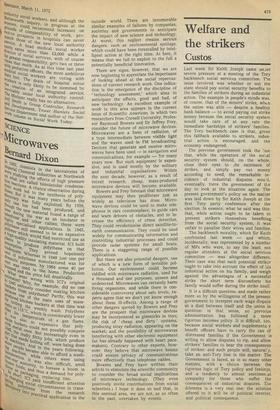Welfare and the strikers custos Last week Sir Keith Joseph
came unier severe pressure at a meeting of the Tory backbench social services committee. The issue involved was whether or not the state should pay social security benefits to the families of strikers during an industrial action. The example in people's minds was. of course, that of the miners' strike, when the union was able — despite a healthy bank balance — to avoid paying out strike money because the social security system would take care of at any rate the immediate hardships of strikers' families. The Tory backbench case is that, given this fallback available to strikers, industrial action is encouraged, and the economy endangered.
The previous government took the !ine that, while the operators of the social security system should, on the whole, close their eyes to he existence of strikes, and simply pay out money according to need, the remarkable incidence of industrial disputes wou'd, eventually, force the government of the day to look at the situation again. The present government's policy on the matter was laid down by Sir Keith Joseph at the first Tory party conference after the election. In essence, what he said was this: that, while action ought to be taken to prevent strikers themselves benefiting from the social security system, it was unfair to panalise their wives and families.
The backbench morality, which Sir Keith confronted last week — and which, incidentally, was represented by a number of MPs who were, to say the least, not regular attenders at the social services committee — was altogether different. Their case was that each potential strikir ought to take into account the effect of his industrial action on his family, and weigh against the advantages of a successful strike the short term discomforts his family would suffer during the strike itself.
It is a difficult question, and made rather more so by the willingness of the present government to interpret each wage dispute as a duel between itself and the union in question: in that sense, no previous administration has followed a more rigorous incomes policy. It is difficult, too, because social workers and supplementa-y benefit officers have to carry the can of distressed families if the Government is willing to allow disputes to rip, and allow strikers' families to bear the consequences of strikes: and such people will, natural'y, take an anti-Tory line in the matter. The Government is faced, as in so many other matters, with a choice between the rigorous logic of Tory policy and feelings, and a tendency to almost sentimen_al sympathy for those who suffer the consequences of industrial disputes. The dilemma is a very real one: the solution offered to it will be of political interest, and political consequence.










































 Previous page
Previous page